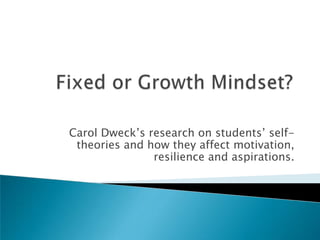Carol Dweck's research over 30 years found that students' beliefs about their abilities (fixed mindset or growth mindset) significantly impacted their motivation, resilience, and achievement. Students with a growth mindset see intelligence as something that can be developed through effort rather than a fixed trait. They are more likely to embrace challenges, persist in the face of setbacks, and achieve at higher levels. Dweck's work highlights the importance of praising students' effort, strategies, and progress rather than innate qualities to foster a growth mindset.













































